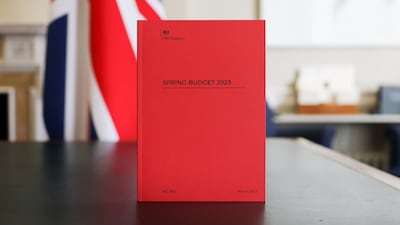People in Britain are still expected to face the biggest fall in living standards on record despite the UK economy avoiding a recession, the fiscal watchdog has said.
The economy will shrink by less than expected and inflation will fall more sharply than previously forecast, in an improved economic outlook in the near term, the Office for Budget Responsibility (OBR) projected.
The position of the Treasury has improved since the last budget statement in November due to declining wholesale energy prices and cooling global inflation.
Previously, the OBR said the UK was due to enter a recession last year and shrink by 1.4 per cent in 2023.
However, the latest projections show the economy is set to avoid a technical recession — two consecutive quarters of decline — and shrink by 0.2 per cent this year as a whole.
It is then due to grow by 1.8 per cent next year, 2.5 per cent in 2025 and 2.1 per cent in 2026 as growth cools.
But the longer-term GDP forecasts are weaker than the OBR had indicated, previously guiding towards economic growth of 2.6 per cent in 2025 and 2.7 per cent in 2026.
The OBR on Wednesday added that the UK remained on course for the sharpest drop in living standards on record over the two years to the end of next March.
The forecaster said the drop would be lower than previously expected but that real households’ disposable income per person would still tumble 5.7 per cent.
Households will therefore feel the pinch more than at any point since 1957, the OBR said.
The spring budget 2023 - in pictures
On Wednesday, the forecasts also showed a sharper drop in inflation this year than previously predicted by both the OBR and the Bank of England.
Inflation is expected to decline by 6.1 per cent this year as a whole, in a revision from previously predicted 7.4 per cent.
It comes after inflation peaked at 11.1 per cent in October as households were hammered by rocketing energy prices and more expensive food.
Inflation is now expected to drop to a lowest point of 0.1 per cent in 2025 before rising again.
“Today the Office for Budget Responsibility forecast that because of changing international factors and the measures I take, the UK will not now enter a technical recession this year," Chancellor Jeremy Hunt told Parliament on Wednesday.
“They forecast we will meet the Prime Minister’s priorities to halve inflation, reduce debt and get the economy growing.”
The Treasury’s finances are also in a better position than previously expected, according to the forecasts, due to higher tax receipts and energy price improvements.
It means that public sector borrowing is on track to hit £152.4 billion ($184 billion) for 2022/23, almost £25 billion less than earlier forecasts.
New measures in the budget, such as increased childcare commitments for working parents, will increase spending, but borrowing is still due to be, on average, £10 billion lower each year from next year onwards.
Nevertheless, the official forecaster also showed that Mr Hunt had given himself much less headroom to meet his fiscal rules than any of his predecessors.
The OBR said the budget measures announced mean that the Chancellor had a buffer of only £6.5 billion to meet his key target of having debt falling as a proportion of the size of economy in five years’ time.
It added that this buffer would reduce to £2.8 billion if fuel duty — which is due to rise by RPI inflation in the projections — is frozen by the government, as it has been in recent years.
Changes to yields on gilts, government bonds, which have fluctuated significantly in recent weeks amid volatility in the financial markets, could also affect this buffer as borrowing costs change.
“The rule is met by a thin margin with the fuel duty indexation, and wafer-thin margin without," said Andy King, member of the Budget Responsibility Committee.














